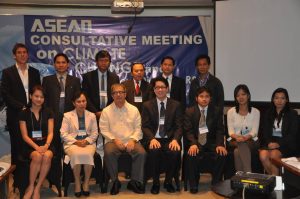NEWS AND UPDATES
ASEAN member states tackles impact of climate change on infectious diseases

In a consultative meeting last October 20, 2011 held at the Dusit Thani Hotel, Makati City, the Association of Southeast Asian Nations (ASEAN) member countries tackled the impact of climate change on vector-borne diseases.
Spearheaded by Dr. Jaime C. Montoya, National Focal Person for the Philippines of the ASEAN Sub Committee on Biotechnology (SCB), and the Executive Director of the Philippine Council for Health Research and Development of the Department of Science and Technology (PCHRD-DOST), the meeting is the Philippines’ attempt towards finding a sustainable solution to the rising number of infectious diseases directly linked to the climate change phenomenon.
In his welcome remarks, delivered by Dr. Jaime C. Montoya, Dr. Graciano P. Yumul, Chair of the ASEAN Committee on Science and Technology (ASEAN COST) and Undersecretary for R&D of the Department of Science and Technology (DOST), emphasized that Climate Change and Health are two of the flagship programs of the ASEAN COST.
“We hope that your inputs to possible collaborative programs will promote cooperation within and among the member states to address the pressing issues of climate change and health in the region,†said Dr. Yumul.
The consultative meeting was a follow-through activity of the Roadmap on Climate Change, Regional Science and Technology Strategic Role, during the ASEAN Ministerial Meeting in November 2009. The roadmap which was developed by the Philippines, the lead country for climate change in collaboration with Vietnam (co-lead country), identified as one of the priority concerns the development of a predictive technology that will forecast spatial and temporal relations of emerging and re-emerging infectious diseases with climate change variations.
In his message, DOST Secretary Mario G. Montejo cited the country’s current initiatives against dengue as examples in addressing impact of climate change on the emergence and re-emergence of infectious diseases.
“We have developed, tested and rolled-out nationwide the Ovicidal Larvicidal (OL) mosquito trap, a low-cost yet effective device designed to reduce the population of the dengue-carrying mosquitoes. This will be complemented by a program called Dengue Early Warning System (DEWS) which includes the development of a Dengue Decision Support System (DDSS) that can be used to forecast dengue disease outbreaks. These are among the steps that the country is taking to mitigate the impact of climate change, particularly on the emergence and re-emergence of infectious diseases,†said Secretary Montejo.
Mr. Joshua Nealon, Technical Officer for Malaria, Vector-Borne and other Parasitic Diseases Unit of the World Health Organization Western Pacific Regional Office (WHO-WPRO) gave a brief presentation on the possible impacts of climate change on health and vector-borne diseases.
“Climate change can have a great number of effects on vector-borne diseases. As the climate warms, the potential geographical range of vectors can increase. When there’s more rainfall, there are more breeding sites for vectors,†explained Mr. Nealon.
One of the highlights of the meeting was the presentation of country initiatives on climate change and health in the areas of policies and programs, research priorities, resources for research, identified research gaps and public health control measures.
An ASEAN collaborative R&D draft proposal entitled Impact of Climate Change on Infectious Diseases in the ASEAN Member States was presented by Ms. Alma Macahia, project leader from the De La Salle University (DLSU) Dasmariñas. The proposal has two components: 1. The Relationship of Climate Change and Geographical Features to the Occurrence of Dengue and Malaria in the ASEAN Member States; and 2. Interactions between Vector Ecosystem and Human Society to address the burden of Dengue and Malaria in the ASEAN Member States.
The participants gave their feedbacks and reactions to the draft R&D proposal and agreed on the following next steps: establishment of database of persons/ institutions/ funding agencies and current/ planned initiatives; collaborative projects with a minimum of three ASEAN countries working together; establishment of facilities for sharing information/ resources; and forging linkages with other existing networks or funding sources outside the ASEAN.




